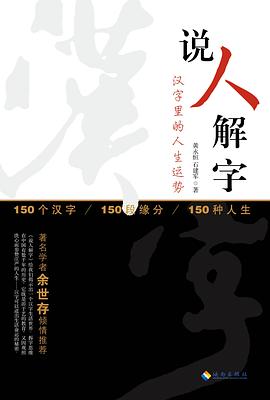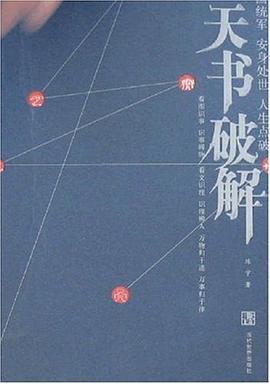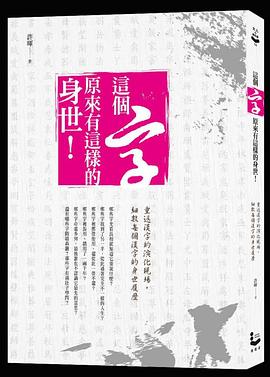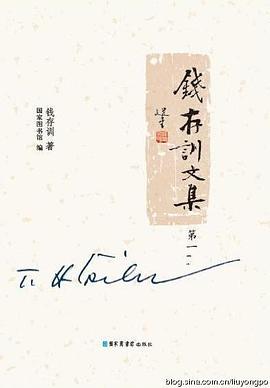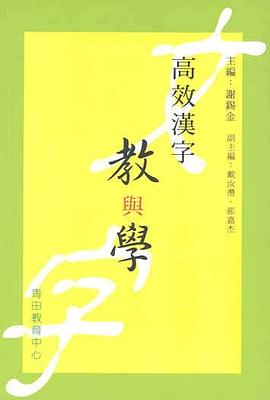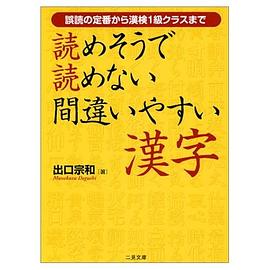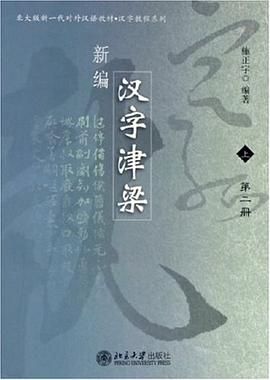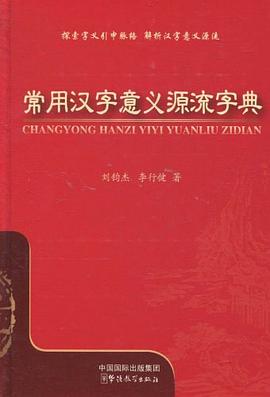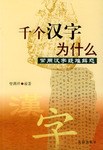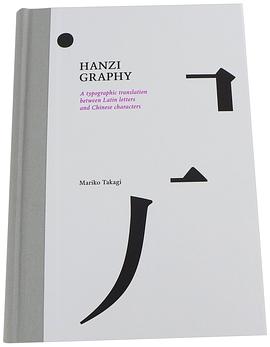

具体描述
Our world today is – from a digital point of view – a village. Non-Latin scripts are accessible and inevitable at the same time. But still the contact itself does not lead to a better understanding of Non-Latin scripts, they remain unfamiliar and mysterious to most Western minds.
Chinese characters are among the so called ‘exotic scripts’ and considered as one of the most complex and incomprehensible writing systems. A very common explanation attempt describes Chinese characters simply as representations of pictograms and pictorial ideas. But this view clearly compromises the capability and expressiveness of Chinese characters. Actually the Chinese writing system is based on agreements regarding the interpretation of meaning.
The book ‘Hanzi Graphy’ is based on a research work that started in 2008 and aims to bridge between the Latin and the Chinese writing systems. By using typography as a common thread, this book is an introduction and primer for Chinese characters.
‘Hanzi Graphy’ starts with a general introduction of the Chinese writing system by demonstrating the six principles of character types. It describes and visualises the differences between Chinese traditional and simplified Hanzis and the Japanese Kanjis. The analysis of the anatomy of Chinese characters in comparison to Latin letters and micro-typographic aspects, each topic fills another chapter. Throughout the book, English typographic terminologies are applied and defined according to the Chinese characters.
The book design and the graphical visualisation of the content shall enhance the accessibility of the topic.
作者简介
Since 2001, Mariko Takagi works as a freelance graphic designer in numerous areas of communication design, ranging from art work for books and catalogues, information and graphic design, pictograms, development of corporate design, brochures, calendars, special interest magazines, to layouts for adverts. Her main interests are conceptual projects that involve her into the development process of the content as well as the design.
At the Design Department of the University of Applied Sciences Muenster, Mariko Takagi took her first teaching assignment in fall 2002/03. For eight semesters, she taught the basics of typography to design students in Muenster. Her teaching assignment was followed by another in 2006 at the University of Applied Sciences Mainz. In Mainz, she taught the basics of art work course for a semester.
From 2007 to 2010, Mariko Takagi taught typography at the University of Applied Sciences Duesseldorf. Simultaneously, she worked as an assistant professor at the Institute for Music and Media of the University of Music, Duesseldorf for Art Work/ Graphic Design.
Ms Takagi considers freelance work on book projects as the third leg of her professional self, in addition to teaching and freelance graphic design. Her books won a number of prizes, e.g. Stiftung Buchkunst, ADC, TDC, red dot and iF Design. Six books on different Japanese culture topics have been developed and published by her. She understands herself as a go-between German and Japanese culture. She has a profound knowledge of Japanese culture and she enjoys introducing this knowledge to international readers.
- See more at: http://ava.hkbu.edu.hk/people/ms-mariko-takagi/#sthash.SYv5aEsp.dpuf
目录信息
读后感
作者在雷丁的毕业设计字体 Gion,包含了拉丁、假名和汉字,汉字部分特别区别了日汉字、简体和繁体中文。估计对汉字的关注是从那个时候开始的。 [http://typefacedesign.net/wp-content/uploads/2014/07/MarikoTakagi_Gion_Specimen_ol.pdf]
评分作者在雷丁的毕业设计字体 Gion,包含了拉丁、假名和汉字,汉字部分特别区别了日汉字、简体和繁体中文。估计对汉字的关注是从那个时候开始的。 [http://typefacedesign.net/wp-content/uploads/2014/07/MarikoTakagi_Gion_Specimen_ol.pdf]
评分作者在雷丁的毕业设计字体 Gion,包含了拉丁、假名和汉字,汉字部分特别区别了日汉字、简体和繁体中文。估计对汉字的关注是从那个时候开始的。 [http://typefacedesign.net/wp-content/uploads/2014/07/MarikoTakagi_Gion_Specimen_ol.pdf]
评分作者在雷丁的毕业设计字体 Gion,包含了拉丁、假名和汉字,汉字部分特别区别了日汉字、简体和繁体中文。估计对汉字的关注是从那个时候开始的。 [http://typefacedesign.net/wp-content/uploads/2014/07/MarikoTakagi_Gion_Specimen_ol.pdf]
评分作者在雷丁的毕业设计字体 Gion,包含了拉丁、假名和汉字,汉字部分特别区别了日汉字、简体和繁体中文。估计对汉字的关注是从那个时候开始的。 [http://typefacedesign.net/wp-content/uploads/2014/07/MarikoTakagi_Gion_Specimen_ol.pdf]
用户评价
我觉得自己读了一本研究生论文。提出一个较为有趣的概念却在内容上缺乏深度。即使找小林章来写序也无法补救其遗憾。
评分论文算不上,只能算整理过的入门百科。。。而且是西方理解的角度。
评分平庸
评分论文算不上,只能算整理过的入门百科。。。而且是西方理解的角度。
评分平庸
相关图书
本站所有内容均为互联网搜索引擎提供的公开搜索信息,本站不存储任何数据与内容,任何内容与数据均与本站无关,如有需要请联系相关搜索引擎包括但不限于百度,google,bing,sogou 等
© 2025 book.quotespace.org All Rights Reserved. 小美书屋 版权所有

